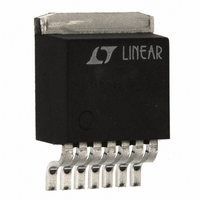LT1370HVCR Linear Technology, LT1370HVCR Datasheet - Page 9

LT1370HVCR
Manufacturer Part Number
LT1370HVCR
Description
IC SWTCHNG REG 6A HI-EFF 7-DD
Manufacturer
Linear Technology
Type
Step-Down (Buck), Step-Up (Boost), Inverting, Cuk, Flyback, Forward Converterr
Datasheet
1.LT1370CRPBF.pdf
(16 pages)
Specifications of LT1370HVCR
Internal Switch(s)
Yes
Synchronous Rectifier
No
Number Of Outputs
1
Voltage - Output
1.25 ~ 42 V
Current - Output
6A
Frequency - Switching
500kHz
Voltage - Input
2.7 ~ 25 V
Operating Temperature
0°C ~ 70°C
Mounting Type
Surface Mount
Package / Case
D²Pak, TO-263 (7 leads + tab)
Lead Free Status / RoHS Status
Contains lead / RoHS non-compliant
Power - Output
-
Available stocks
Company
Part Number
Manufacturer
Quantity
Price
Part Number:
LT1370HVCR#PBF
Manufacturer:
LINEAR/凌特
Quantity:
20 000
Part Number:
LT1370HVCR#TRPBF
Manufacturer:
LINEAR/凌特
Quantity:
20 000
APPLICATIO S I FOR ATIO
3. Decide if the design can tolerate an “open” core geom-
4. Start shopping for an inductor that meets the
5. After making an initial choice, consider the secondary
Output Capacitor
The output capacitor is normally chosen by its effective
series resistance (ESR), because this is what determines
output ripple voltage. At 500kHz any polarized capacitor
is essentially resistive. To get low ESR takes volume , so
physically smaller capacitors have high ESR. The ESR
range needed for typical LT1370 applications is 0.025Ω
to 0.2Ω. A typical output capacitor is an AVX type TPS,
22µF at 25V (two each), with a guaranteed ESR less than
0.2Ω. This is a “D” size surface mount solid tantalum
capacitor. TPS capacitors are specially constructed and
etry, like a rod or barrel, which has high magnetic field
radiation, or whether it needs a closed core, like a
toroid, to prevent EMI problems. One would not want an
open core next to a magnetic storage media, for
instance! This is a tough decision because the rods or
barrels are temptingly cheap and small and there are no
helpful guidelines to calculate when the magnetic field
radiation will be a problem.
requirements of core shape, peak current (to avoid
saturation), average current (to limit heating) and fault
current. If the inductor gets too hot, wire insulation will
melt and cause turn-to-turn shorts. Keep in mind that
all good things like high efficiency, low profile and high
temperature operation will increase cost, sometimes
dramatically.
things like output voltage ripple, second sourcing, etc.
Use the experts in the LTC Applications Department if
you feel uncertain about the final choice. They have
experience with a wide range of inductor types and can
tell you about the latest developments in low profile,
surface mounting, etc.
I
V
f = 500kHz switching frequency
PEAK
IN
= Minimum input voltage
= (I
OUT
)
U U
) )
V
V
OUT
IN
+
V
2(f)(L)(V
IN
(V
W
OUT
– V
OUT
IN
)
)
U
tested for low ESR, so they give the lowest ESR for a given
volume. To further reduce ESR, multiple output capaci-
tors can be used in parallel. The value in microfarads is
not particularly critical, and values from 22µF to greater
than 500µF work well, but you cannot cheat mother
nature on ESR. If you find a tiny 22µF solid tantalum
capacitor, it will have high ESR and output ripple voltage
will be terrible. Table 1 shows some typical solid tantalum
surface mount capacitors.
Table 1. Surface Mount Solid Tantalum Capacitor
ESR and Ripple Current
E CASE SIZE
AVX TPS, Sprague 593D
AVX TAJ
D CASE SIZE
AVX TPS, Sprague 593D
AVX TAJ
C CASE SIZE
AVX TPS
AVX TAJ
B CASE SIZE
AVX TAJ
Many engineers have heard that solid tantalum capacitors
are prone to failure if they undergo high surge currents.
This is historically true and AVX type TPS capacitors are
specially tested for surge capability, but surge ruggedness
is not a critical issue with the output capacitor. Solid
tantalum capacitors fail during very high turn-on surges,
which do not occur at the output of regulators. High
discharge surges, such as when the regulator output is
dead-shorted, do not harm the capacitors.
Single inductor boost regulators have large RMS ripple
current in the output capacitor, which must be rated to
handle the current. The formula to calculate this is:
Output Capacitor Ripple Current (RMS)
DC = Switch duty cycle
I
RIPPLE
(RMS) = I
= I
OUT
OUT
ESR (MAX Ω)
0.1 to 0.3
0.7 to 0.9
0.1 to 0.3
0.9 to 2.0
1.8 to 3.0
0.2 (Typ)
2.5 to 10
1 – DC
V
DC
OUT
V
IN
– V
IN
RIPPLE CURRENT (A)
0.36 to 0.24
0.22 to 0.17
0.16 to 0.08
0.7 to 1.1
0.7 to 1.1
0.5 (Typ)
LT1370
0.4
sn1370 1370fs
9













